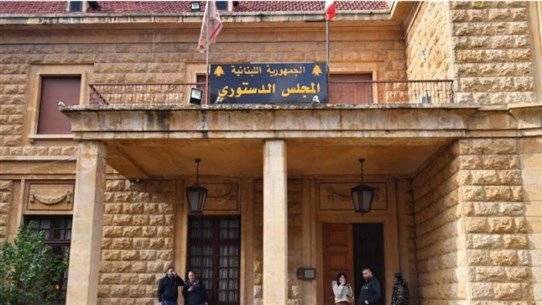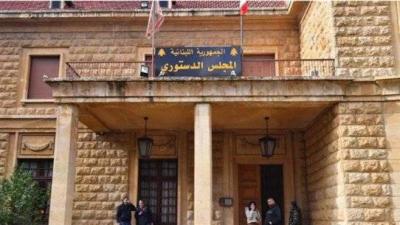Between rejecting defeat and relying on valid and convincing evidence, attention turns to the Constitutional Council in the coming weeks, as objections are recorded against the final election results in several districts, including Beirut II, Metn, Kesrouan, Tripoli, and Akkar. With violations in the Baalbek-Hermel district exceeding the limits of contestation, there are also impending criminal complaints that the "Lebanese Forces" (LF) plans to file following acts of intimidation and assaults that targeted the electoral campaign of MP Antoine Habchi in several Bekaa villages.
Though contesting and reviewing the election results ensures their integrity, it presents the Constitutional Council and its members with a new challenge to prove their independence and ability to rule on the appeals submitted to the Council presidency within a maximum period of 30 days from the announcement of the results. The legislator has restricted the right to appeal to the losing candidate, provided they are from the same electoral district and running for the same parliamentary seat (i.e., from the same sect in case there are multiple seats for a sect in that district), opening the door for various interpretations on this issue.
This is applicable to the Metn district, where the (first losing) candidate Jadd Ghosn has announced his intention to contest the results due to violations that prevented his list from crossing the electoral threshold by a margin of 88 votes, securing his victory for the Maronite seat. Thanks to the current electoral law regarding result calculations, accepting the appeal and ruling positively on it poses a risk to the identity of many elected deputies, affecting not just the seat belonging to the "appealing candidate's" sect, but likely also resulting in the loss of the "Together Stronger" list's second seat and consequently the elected MP Agob Baghradyan's seat, in favor of Armenian candidate Ara Bardaghdjian from the "Metn of Liberty" list supported by the "Lebanese Forces," who would replace elected MP Razi al-Haj.
Objections are not limited to Metn, as the "Lebanese Forces" express their apprehensions with the increasing talk about tampering with election results in Kesrouan-Jbeil. MP Shawki Dakkash announced in a statement that "boxes of a specific sectarian color arrived late, coinciding with the announcement of MP Fred Khazen's victory after the competition had been limited to candidates Shadi Fayyad and Josephine Zghib." The "Lebanese Forces," which recorded several violations and filed objection letters specifically in Baalbek-Hermel and Kesrouan, are studying the legal implications that can be worked on. The first loser in Kesrouan, Josephine Zghib, is preparing to contest the election results, stating in an interview with "Nidaa al-Watan" that the appeal is based on evidence, chiefly the announcement of results that differ from those displayed on screens during the counting, leading to the announcement of MP Fred Khazen's victory.
In the north, Faisal Karami, candidate for the Sunni seat in Tripoli, confirmed that he will take all necessary legal action based on his adherence to the laws, having proven with clear material evidence that the results have been subject to a meticulous forgery process. He clarified in a statement that "the democratic process in Lebanon is far from genuine and transparent democracy, and the scale of violations and offenses is very serious." This coincided with the announcement by the candidate for the Alawite seat on the "Akkar First" list, Haidar Issa, expressing his protest against the election results and his desire to contest them, asserting that "I was replaced by candidate Ahmad Rustam on the 'National Moderation' list by a margin of 67 votes while hundreds of ballots were not counted for me." Issa noted the confusion that occurred shortly before the final announcement of results in the Khitaba about the tallies and how everyone was removed from the hall in the presence of masked security personnel, questioning "how did the competitor's tally rise from 7,000 votes to 12,000, in less than a minute at his expense and at the expense of his list?”
Similarly, Beirut and specifically the Second District has not escaped skepticism about the results. MP Fouad Makhzoumi announced that "the delay in announcing the results of Beirut II for 36 hours, alongside the forgery and manipulation of our list's results to sabotage two guaranteed seats for us according to all electoral machines’ figures, will compel us to contest the result."
To understand the course the appeals will take, former MP and lawyer Ghassan Makhayber explained to "Nidaa al-Watan" that the jurisprudence of the Lebanese and French Constitutional Councils considers the grounds for appeals and violations that may lead to changing results, placing it before two options: either to annul the entire elections due to the violations that marred them, thereby mandating the administration to call for new elections, or to annul the candidacy of a specific candidate and declare the candidacy of the first losing candidate. He noted that the council had previously looked into many appeals and annulled ballot boxes and votes that were marred by violations leading to the annulment of a selected candidate's candidacy and declaring another candidate's victory.
While the appeals to the Constitutional Council are not limited to counting votes and ballot boxes, they include electoral campaigns that can constitute a violation of electoral law, he observed that the council's jurisprudence is often cautious regarding the consequences of violations related to campaign regulations, which are tied to exceeding rules and conditions of media representation and equal treatment of candidates in media and campaign expenditure limits.
Alongside the violations marked by the electoral machines, the preliminary report from the "Lebanese Association for Democratic Elections (LADE)" highlighted that the voting process that took place on Sunday, May 15, was marred by numerous discrepancies and blatant violations, intimidation, and pressures exerted by various political entities; the documented violations throughout the long electoral day present a disappointing factor that undermines the essence of the democratic process. This represents a supportive factor that the Constitutional Council can rely on in ruling on the appeals before it, which could restore "happiness" to those deserving it.
Tony Karam - Nidaa al-Watan




